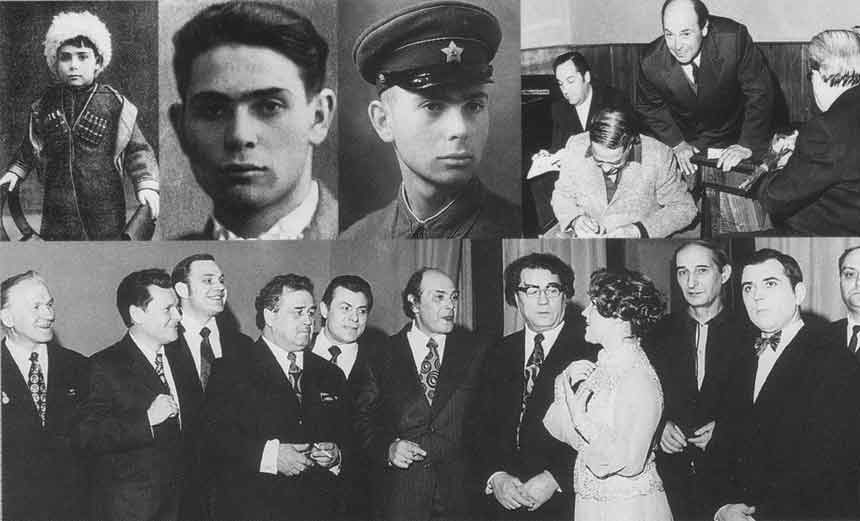Igor
Naumovich Shamo is one of the most popular modern Ukrainian
composers.
Igor
Shamo’s life and creative work are connected with Kiev,
where he was born in 1925. Being the Soviet Army officer,
he went back to Kiev after the Great Patriotic War. In
1951 he graduated from Kiev Music Conservatory, the composition
class of Professor Boris Lyatoshynsky.
Thanks
to bright aptitude and high level of professionalism Igor
Shamo performed in absolutely different kinds, forms and
genres of musical art.
In
the field of instrumental music the composer preferred
genre pictorial and graphic musical imagery. Such are
not only ‘Moldavian Rhapsody’, suite ‘Fluerash’, ‘Festival
Suite’ and the other compositions for symphonic orchestra,
but also ‘The Pictures of Russian Painters’, ‘Ukrainian
Suite’, ‘The Songs of the Friends’ suite for piano and
a lot of the pieces for chamber ensembles and even the
chorus (‘Carpathian Suite’ etc.).
In
such kind of works an emphasis on intonation and modal
characteristics of national music plays the great role.
Such weakness of the composer found its realization in
chorus opera called ‘Yatran games’ (libretto by V. Yukhimovych).
Written for the soloists and an A Capella chorus, it constitutes
a bright example of original realization of Ukrainian
folk ceremonial and calendar songs.
At the same time, such Igor Shamo’s works as a Symphony
No. 1 for string orchestra, Simphonietta concert for chamber
orchestra, a Symphony No. 3 ‘In memory of the heroes’,
etc. create substantial images of philosophically deep,
lyrical and dramatic simphonizm. Pathetic lyricism which
is typical for many various Shamo’s works found its fullest
realization in the songs. Developing the line of lyric
songs in Ukrainian music, Igor Shamo enriched it with
pathos of high public spirit, having created his original
style of modern Komsomol and youth songs. Igor Shamo’s
works enjoy wide popularity in musical life, pedagogical
practice of musical educational institutions, at the concerts
as well as on radio and TV programs.
The radio listeners, especially the rural ones, often
ask the Ukrainian radio to broadcast the Ukrainian folk
songs such as ‘Ne shumy, kalynonko’ (‘Do not rustle, snowball
tree’), ‘Karpaty, Karpaty’ (‘The Carpathian Mountains’),
‘Oy, verbychenko’ (‘Oh, willow’). The authors of such
letters did not even suspected that these works are not
folk, but they are Igor Shamo’s ones. This ‘mistake’,
as a matter of fact, evidences people’s recognition.
So, what was the composer’s life?
Igor’s father and mother liked songs, but had never been
engaged in music. Unlike them, the boy was born together
with it. Igor showed his talent for music at school already.
He underwent basic training with famous teacher D. Pisarevsky
who recommended his student to special musical school
where such famous teachers as K.N. Mikhailov, A.A. Yankelevich,
A.M. Lufer, M.A. Gozenpud worked.
Bakh was Igor’s idol from a boy. The boy also was delighted
with ‘explosive’, impulsive Shuman, liked Musorgsky and
Rakhmaninov. All these composers played a great role in
further Igor’s musical development. Being the student
with pronounced creative abilities, Igor Shamo together
with the others students was moved up into newly opened
composer’s class. The lessons in the class gave the boy
much necessary knowledge and many skills; they accustomed
him to independence. Igor had many passions. In addition
to music, he liked history and literature. Also, he liked
painting, and he was good in it. But music came unconditionally
first. He firmly resolved on studying in composer’s faculty
of the Kiev Conservatory after school. But these plans
were prevented by the war with fascist Germany. Igor was
ending the tenth class.
His father and brother went to the front.
The young man remained with his mother with whom he evacuated
to Ufa. He entered the medical institute there. Having
studied one academic year, he volunteered to serve in
front-line forces. Military Field-Marshal Igor Shamo went
through the whole war – from Volga to Berlin – consisting
of medical battalion.
In spring, 1946, the headquarters received a letter signed
by the conservatory professors. It contained a request
to refer the former graduate of special musical school
Igor Shamo for further study at the conservatory. Shortly
thereafter, Lieutenant Igor Shamo together with Lieutenant
Lyudmyla Shamo (they married not long before in Vienna)
left for Kiev.
One had to give at least one own composition at entrance
examination, but Igor had no one. A piece occurred at
the last moment, on the eve of the examination. But Igor
was pressed for time to write it. So, he played his ‘Fantastichesky
marsch’ (‘Fantastic march’) to the examining board without
music, which, contrary to his expectations, created an
impression.
As a result, Shamo was offered to enter the second year
at once, but he evaluated his knowledge sensibly: he entered
the first year to his pre-war teacher M.A. Gozenpud. At
the chair of composition his teachers were Lev Nikolayevich
Revutsky and Boris Nikolayevich Lyatoshynsky.
In 1948, still a student, Igor Shamo became a member of
Composers’ Union. On annual contests for the best student’s
work he had been winning the first place during five years
on end. In 1951, at the graduation concert, Igor Shamo
performed his ‘Kontsert-Ballada’ (‘Concert-Ballade’) on
piano accompanied by symphonic orchestra. The work entered
concert life. It can be heard in Kiev, and then in the
author’s performance, in Moscow. Creative development
of the young composer began just after the graduation
concert. After graduation from the conservatory new vistas
were opened up before Igor.
He worked much and hard not stopping on his way to professional
improvement.
Igor
Naumovich Shamo died on 17 August 1982 in Kiev.
He was buried on Baykovoe memorial cemetery.
